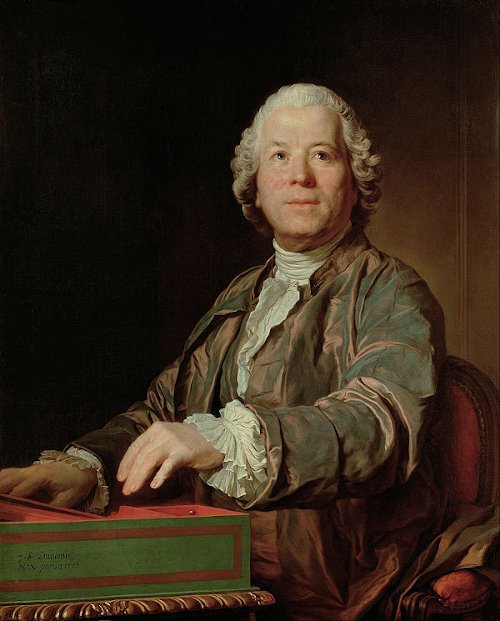Composer and imperial chamber composer in Vienna from 1774. Among the most influential composers of the eighteenth-century, Gluck was best known for his reform operas with the poet Ranieri de’ Calzabigi, including Orfeo (1762), Alceste (1767) and Paride ed Elena (1770); his French operas Armide (1777) and Iphigénie en Tauride (1779); and his ballet Don Juan ou Le Festin de Pierre (1761).

Joseph Duplessis, Gluck playing his clavichord, 1775
- Mozart Relevance
-
Leopold Mozart attended a performance of Orfeo in Vienna on 10 October 1762 and Mozart attended a performance of Alceste at Schönbrunn on 25 November 1781. Mozart’s Die Entführung aus dem Serail K384 was performed at Gluck’s request on 6 August 1782 and on 11 March 1783 Gluck attended the Burgtheater concert of Mozart’s sister-in-law, Aloysia Lange, at which Mozart performed the concerto K175+382 and Aloysia sang the aria ‘Alcandro, lo confesso-Non so d’onde viene’ K294; the Langes and the Mozarts had dinner with Gluck on 16 March. In December 1787 Mozart was appointed k.k. Kammermusikus, de facto an honorary appointment made after Gluck’s death. Several works by Mozart and his father have direct links with Gluck: Leopold arranged four dances from Gluck’s Don Juan sometime during the 1760s or 1770s (LMV XVI:2); about 1773-1775 father and son arranged numbers from Gluck’s Paride ed Elena for 2 flutes, 3 trumpets in C, 2 trumpets in D and 4 timpani in C, G, D and A (K187 and LMV VI:11); in 1783 Mozart arranged for keyboard the opening of ‘Non vi turbate, no’ K236 from Gluck’s Alceste, presumably intended for a set of variations; and at his 23 March 1783 Burgtheater concert, he improvised variations on ‘Unser dummer Pöbel meint’ K455 from Gluck’s La Rencontre imprévue.
- Category/Role
- Composer
- Date 1
- 1714-07-02 Erasbach bei Berching
- Date 2
- 1787-11-15 Vienna